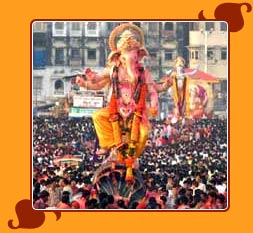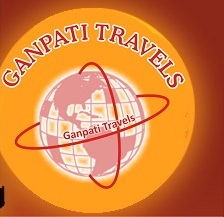Ganesh Chaturthi is celebrated on
the birthday of Lord Ganesh (Ganesha), the god of wisdom and prosperity on
the fourth day of the moons bright fortnight, or period from new moon in the
lunar month of Bhadrapada. The celebration of Ganesh Chaturthi continue for
five, seven, or ten days. Some even stretch it to twenty one days, but ten
the most popularly celebrated. In the tradition of the right hand path the
first day is the most important. In the left hand path tradition the final
day is most important.

Ganesha is the god of wisdom and prosperity and is invoked before the
beginning of any auspicious work by the Hindus. It is believed that for the
fulfillment of one's desires, his blessing is absolutely necessary.
According to the mythology, he is the son of Shiva and Parvati, brother of
Kartikeya - the general of the gods, Lakshmi - the goddess of wealth and
Saraswati-the goddess of learning. There are numerous stories in Hindu
mythology, associated with the birth of this elephant-headed god, whose
vehicle is the Mooshak or rat and who loves Modaks (droplet shaped Indian
sweet).
Ganesh Chaturthi Celebrations The
festival of Ganesh Chaturthi is celebrated the states of Maharashtra, Tamil
Nadu, Karnataka and Andhra Pradesh and many other parts of India. Started by
Chatrapati Shivaji Maharaja, the great Maratha ruler, to promote culture and
nationalism, the festival was revived by Lokmanya Tilak (a freedom fighter)
to spread the message of freedom struggle and to defy the British who had
banned public assemblies. The festival gave the Indians a feeling of unity
and revived their patriotic spirit and faith. This public festival formed
the background for political leaders who delivered speeches to inspire
people against the Western rule.
The festival is so popular that
the preparations begin months in advance. Ganesha statues installed in
street corners and in homes, and elaborate arrangements are made for
lighting, decoration, mirrors and the most common of flowers. Poojas (prayer
services) are performed daily. The artists who make the idols of Ganesh
compete with each other to make bigger and more magnificent and elegant
idols. The relevantly larger ones are anything from 10 meters to 30 meters
in height. These statues are then carried on decorated floats to be immersed
in the sea after one, three, five, seven and ten days. Thousands of
processions converge on the beaches to immerse the holy idols in the sea.
This procession and immersion is accompanied by drum- beats,
devotional songs and dancing. It is still forbidden to look at the moon on
that day as the moon had laughed at Ganesha when he fell from his vehicle,
the rat. With the immersion of the idol amidst the chanting of "Ganesh
Maharaj Ki Jai!" (Hail Lord Ganesh). The festival ends with pleas to
Ganesha to return the next year with chants of "Ganpati bappa morya,
pudcha varshi laukar ya" (Hail Lord Ganesh, return again soon next
year.
A Legendary Tale Associated With ModaksHindu
mythology has a story to tell even about Ganesha’s modaks. It is said
that Ganesha loved modaks and simply could not stop himself from eating
them. In fact he devoured them by the hundreds. Amused by Ganesha’s
obsession with modaks, once the beautiful moon made fun of the chubby God.
Ganesha was so furious with the moon that he cursed him, saying that his
beauty would never remain constant. Since that day, way back in time, the
moon reveals itself in all its magnificence only once in 28 days.
Observing
of FastOnly a few people observe a fast on this festival as, for
the most part, the general feeling is that Ganesha’s birthday should be
an occasion for pigging out and not for fasting. The few who do keep a fast
are allowed to eat various sweets like til ka ladoo (a round sweetmeat made
of sesame, flour and sugar), gajak, rewari (sweets made of jaggery and
nuts), along with tea and coffee.
Grand Celebration
in RajasthanIn Rajasthan, people place a garlanded idol of Ganesha
smeared with vermilion, right outside their homes. If front of the image
they keep a plate with some vermilion and turmeric powder so each passerby
can put a pinch of the sacred powder on his forehead and feel blessed by
Ganesha.
Anant ChaudasThe festival comes to
an end on the day of Anant Chaudas. On this day, the idols of Ganesha are
taken from various pandals, doorsteps, localities and puja rooms for a truly
royal ride. The streets of Mumbai are packed with multitudes as each
locality comes out on the streets with its Ganesha. Amidst shouts of ‘Ganpati
Bappa Moriya Pudhchya Varshi Lavkarya’ (Marathi for – Oh Ganpati
My Lord, return soon next year), a sea of humanity carries the idols to the
waters of the Arabian Sea.
Firecrackers announce the arrival of
the procession that halts every now and then for people to get a last
glimpse of their favourite God and seek his blessings, for he is the remover
of all obstacles. The idols are carried into the holy waters, and face the
direction of the local community centres they started their journey from,
till their visarjan, or immersion. In other towns and villages, folks carry
the idols to the local river or tank for the visarjan ceremony. As dusk
takes charge of the skies, people return to their localities and homes,
awaiting Ganesha’s return the following year. Artists and sculptors
start imagining how they will make an even nicer Ganesha next year.
Housewives fret about making better modaks and pedas than Mrs X. The
community at large thinks of superior and more elaborate pandals and
processions, on there way back home and to work. In this country of almost a
billion people, Ganesha plays his part. He generates work, adds meaning to
their life and gives them hope.






